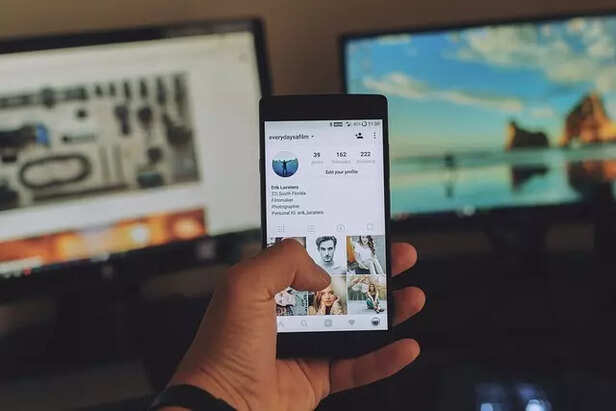The Hidden Cost of Scrolling: Read This Before Scrolling Again
Amritansh Nayak | Apr 17, 2025, 15:12 IST
social media addiction
This composition explores how inordinate social media use and short- form content are shrinking our attention spans. It examines the brain’s dopamine response, symptoms of dropped focus, and how instant delectation culture affects productivity. Practical way are handed to help rebuild attention and reclaim internal clarity in a distracted digital world.
In the moment's presto- paced digital world, our attention spans are shrinking — and social media is a major malefactor. From endless scrolling to addicting short- form videos, our smarts are constantly bombarded with quick prices and instant delectation. This composition dives into the wisdom behind attention and dopamine, explores how our focus is being rewired, highlights advising signs, and offers practical ways to recapture control in an increasingly distracted world.

The wisdom Behind
Ever notice how a quick scroll through social media can turn into an hour-long rabbit hole? That’s not by accident — it's brain wisdom. Social media platforms are finagled to commandeer your brain’s price system using dopamine, the “ feel- good ” chemical. Every like, comment, or new post triggers a bitsy dopamine megahit, making your brain crave further of that quick price. Over time, this rewires how we concentrate. Rather than concentrating on one task deeply, we start surveying for the coming burst of stimulation. This constant flood tide of novelty trains our smarts to seek immediate delectation, making it harder to sit through a full movie, read a book, or concentrate on work without getting distracted.
Think of your attention span like a muscle. The more you jump from one thing to another, the weaker it gets. The brain becomes addicted to short- term pleasure, making long- term focus feel like a chore. And since dopamine is involved in provocation and literacy too, this shift doesn’t just affect your social media habits it can impact productivity, memory, and emotional regulation.
Understanding how this works is the first step toward breaking the cycle — and reclaiming your capability to concentrate.

From Instagram Reels to YouTube Films, suck - sized content is far and wide and our smarts are paying the price. These fast, punchy videos are designed to share your attention in seconds, keep you hooked, and push you to the coming dopamine megahit. It feels delightful and royal, but underneath the face, a commodity deeper passing your brain is being rewired. Short- form content promotes what is called "micro-consumption" rapid-fire input of quick, high- encouragement information. Over time, this trains the brain to anticipate fast prices and constant novelty. The result? A shrinking attention span and dropped forbearance for slower, more meaningful content like papers, podcasts, or indeed in- depth exchanges.
The further we consume this kind of content, the further we crave it, and the harder it becomes to stay focused on tasks that bear tolerance or deep thinking. It’s like feeding your brain delicacy rather than a full mess — delicious in the moment, but lacking real substance. This shift does not just impact entertainment habits; it spills over into academy, work, and connections. Feeding the goods of micro-consumption is crucial to reclaiming internal clarity. Because while the scroll is easy, focus is important and worth guarding.

Ever catch yourself rereading the same judgment five times? Or opening your phone to do one thing, only to end up scrolling Instagram 20 twinkles later? These little moments might feel inoffensive, but they’re signs of a deeper issue: a shrinking attention span. One of the most common symptoms is internal drift — your mind constantly wandering, indeed during simple tasks. You may struggle to finish a book, follow a discussion without zoning out, or stay concentrated during meetings or classes. Multitasking becomes the norm, but nothing ever feels completely completed. Another red flag is the constant appetite to check your phone, indeed when there is no real reason. That “ itch ” to scroll, refresh, or jump to commodity news is your brain seeking a dopamine fix after being trained by quick- hitting content.
You might also notice increased procrastination and reduced tolerance — tasks feel more inviting, and you are more fluently frustrated by anything that takes time or trouble. These symptoms creep in still, frequently going unnoticed until focus feels like a lost skill. The good news? With mindfulness and many changes in habit, attention can be rebuilt. The first step is noticing when it starts to slip.

Social Media’s part in the
Scroll, valve, like, reprise. Social media thrives on one important principle: moment delectation. With just a swipe, we get a flood tide of entertainment, confirmation, and information — all delivered in seconds. It's presto, it's easy, and it feels good. But over time, this constant access to immediate prices reshapes how we suppose, feel, and bear. Platforms like Instagram, TikTok, and Twitter are designed to give us quick successes of satisfaction. A like or comment triggers dopamine in the brain, buttressing the habit and making us crave more. The further we engage, the further our smarts are wired to seek instant pleasure — frequently at the expense of long- term thinking.
This shift affects further than our screen time. It can make real- life tasks like studying, working, or pursuing pretensions feel slow, boring, or indeed unsupportable. Why struggle through a grueling design when a fun videotape is one click down? Over time, tolerance wears thin, frustration rises hastily, and the capability to delay delectation — a crucial particularity for success — weakens. Social media didn’t construct the need for instant prices, but it amplified it to a position our smarts weren’t erected to handle. Feting that's the first step to taking back control.

In a world full of announcements, pop- ups, and endless scrolls, concentrate feels like a misplaced art. But the good news? Just like muscles, attention can be trained and strengthened again with intention and thickness. Launch by setting boundaries with your bias. Turn off unnecessary announcements, use “ Do Not Disturb ” during deep work, and try app timekeepers to limit your social media operation. Indeed, small ways, like keeping your phone in another room while working, can make a huge difference.
In the moment's hyperactive- connected world, our attention is under constant attack — from endless announcements to the addicting pull of short- form content. Social media, while offering convenience and connection, has still reshaped how our smarts seek pleasure and process information. The result is a culture of instant delectation, docked attention spans, and a growing struggle to concentrate deeply on what truly matters. But this isn’t the end of the story.
Understanding the wisdom behind our actions empowers us to make purposeful changes. By setting boundaries, rehearsing awareness, and training our focus like a muscle, we can begin to reclaim our attention and restore internal clarity. Rebuilding focus isn’t about rejecting technology, it's about using it purposely. In a world erected to distract, choosing to concentrate is a radical and important act. And it starts with mindfulness, followed by small, harmonious ways toward a more present and focused life.
Explore the latest trends and tips in Health & Fitness, Travel, Life Hacks, Fashion & Beauty, and Relationships at Times Life!

social media addiction
The wisdom Behind Attention Span and Dopamine Triggers
Think of your attention span like a muscle. The more you jump from one thing to another, the weaker it gets. The brain becomes addicted to short- term pleasure, making long- term focus feel like a chore. And since dopamine is involved in provocation and literacy too, this shift doesn’t just affect your social media habits it can impact productivity, memory, and emotional regulation.
Understanding how this works is the first step toward breaking the cycle — and reclaiming your capability to concentrate.

How social media binds you
Micro-Consumption How Short- Form Content Rewires the Brain
The further we consume this kind of content, the further we crave it, and the harder it becomes to stay focused on tasks that bear tolerance or deep thinking. It’s like feeding your brain delicacy rather than a full mess — delicious in the moment, but lacking real substance. This shift does not just impact entertainment habits; it spills over into academy, work, and connections. Feeding the goods of micro-consumption is crucial to reclaiming internal clarity. Because while the scroll is easy, focus is important and worth guarding.

Addicted to Your Phone
Symptoms of dropped Attention in Daily Life
You might also notice increased procrastination and reduced tolerance — tasks feel more inviting, and you are more fluently frustrated by anything that takes time or trouble. These symptoms creep in still, frequently going unnoticed until focus feels like a lost skill. The good news? With mindfulness and many changes in habit, attention can be rebuilt. The first step is noticing when it starts to slip.

Your Brain Hooked on Likes?
Social Media’s part in the Instant Gratification Culture
This shift affects further than our screen time. It can make real- life tasks like studying, working, or pursuing pretensions feel slow, boring, or indeed unsupportable. Why struggle through a grueling design when a fun videotape is one click down? Over time, tolerance wears thin, frustration rises hastily, and the capability to delay delectation — a crucial particularity for success — weakens. Social media didn’t construct the need for instant prices, but it amplified it to a position our smarts weren’t erected to handle. Feting that's the first step to taking back control.

social media affect media health
Steps to Rebuild Focus in a detracted Digital World
In the moment's hyperactive- connected world, our attention is under constant attack — from endless announcements to the addicting pull of short- form content. Social media, while offering convenience and connection, has still reshaped how our smarts seek pleasure and process information. The result is a culture of instant delectation, docked attention spans, and a growing struggle to concentrate deeply on what truly matters. But this isn’t the end of the story.
Understanding the wisdom behind our actions empowers us to make purposeful changes. By setting boundaries, rehearsing awareness, and training our focus like a muscle, we can begin to reclaim our attention and restore internal clarity. Rebuilding focus isn’t about rejecting technology, it's about using it purposely. In a world erected to distract, choosing to concentrate is a radical and important act. And it starts with mindfulness, followed by small, harmonious ways toward a more present and focused life.
Explore the latest trends and tips in Health & Fitness, Travel, Life Hacks, Fashion & Beauty, and Relationships at Times Life!
